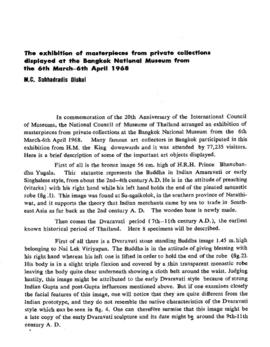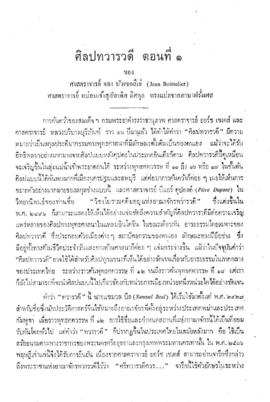วิวัฒนาการของประติมากรรมสมัยทวารวดี
- TH Subhadradis 02 ACAR-01-093
- Item
- 2516
Part of บทความ
ศิลปะทวารวดีภายในประเทศไทยเจริญขึ้นระหว่างราวพุทธศตวรรษที่ 12 – 16 ทางภาคกลางของประเทศไทย มีศูนย์กลางอยู่ที่เมืองนครปฐม คูบัว อ่างทอง และลพบุรี และได้แผ่ขึ้นไปทางเหนือยังอาณาจักรหริภุญชัย (ลำพูน) จนกระทั่งถึงราวต้นพุทธศตวรรษที่ 19 ประติมากรรมสมัยทวารวดีส่วนใหญ่สร้างขึ้นในพุทธศาสนา ได้รับอิทธิพลมาจากศิลปะอินเดียสมัยคุปตะและหลังคุปตะ แต่ก็ยังคงแสดงถึงอิทธิพลของศิลปะอินเดียสมัยอมราวดีซึ่งเข้ามาถึงก่อนหน้านั้น ตัวอย่างของศิลปะทวารวดีสมัยต้น ได้แก่ 1) พระพุทธรูปยืนศิลาขนาดเล็ก ครองจีวรตามแบบอมราวดีแต่จีวรไม่มีริ้ว แสดงปางประทานอภัยหรือวิตรรกะ 2) พระพุทธรูปนาคปรกศิลา ค้นพบที่เมืองฝ้าย อำเภอลำปลายมาศ จังหวัดบุรีรัมย์ 3) พระพุทธรูปศิลาปางสมาธิ ค้นพบในถ้ำเขาพระ อำเภออู่ทอง จังหวัดสุพรรณบุรี 4) ประติมากรรมดินเผา ค้นพบที่เมืองคูบัว อำเภอเมือง จังหวัดราชบุรี 5) ประติมากรรมดินเผาค้นพบที่อำเภออู่ทอง จังหวัดสุพรรณบุรี 6) เทวรูปพระคเณศศิลา ค้นพบที่เมืองพระรถ ดงศรีมหาโพธิ จังหวัดปราจีนบุรี ตัวอย่างศิลปะทวารวดีสมัยที่สอง ได้แก่ 1) พระพุทธรูปยืนศิลาองค์ใหญ่ พบที่ดงศรีมหาโพธิ จังหวัดปราจีนบุรี 2) พระพุทธรูปยืนสัมฤทธิ์ สูง 1.20 เมตร ค้นพบที่เมืองฝ้าย อำเภอลำปลายมาศ จังหวัดบุรีรัมย์ พร้อมกับประติมากรรมรูปพระศรีอาริยเมตไตรย 2 องค์ สูง 47 เซนติเมตร และสูง 1.37 เมตร ศิลปะทวารวดีสมัยที่สาม อิทธิพลศิลปะขอมสมัยบาปวนเริ่มเข้ามาปะปน ตัวอย่างที่ดีที่สุดคือ พระพุทธรูปปางสมาธิศิลา ค้นพบ ณ วัดพระศรีรัตนมหาธาตุ จังหวัดลพบุรี.
ศ. ม.จ. สุภัทรดิศ ดิศกุล




